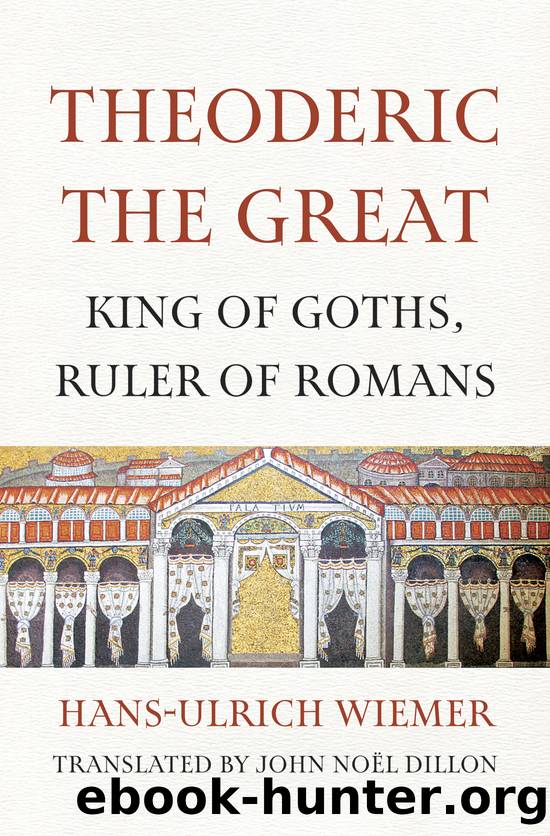Theoderic the Great by Hans-Ulrich Wiemer;

Author:Hans-Ulrich Wiemer;
Language: eng
Format: epub
ISBN: 9780300271850
Publisher: Yale University Press
7. THE KING AND HIS LAND: DID THEODERIC HAVE AN ECONOMIC POLICY?
With respect to the rural population, Theodericâs government by and large continued the policy of the late Roman emperors. Like them, Theoderic attempted to conserve the social order as he had found it. The taxation system depended on agricultural production, after all. He still, however, indulged large landholders more than the late Roman emperors had done, allowing landlords to transfer slaves that had leased land and soil-bound tenants to other owners while keeping the land itself. In Theodericâs Edict, Theoderic states,
May every master be permitted to transfer rural slaves of either sex, even if they are bound to the soil [originaria], from estates that he possesses physically and by legitimate title to other places he controls, or to assign them to urban duties, such that they become attached to the estates to which they have migrated according to their masterâs will or are rightly considered members of the urban house-servants; nor may any investigation be launched into such actions and orders, as, for example, on the grounds of their origin [origo]. Masters shall be permitted to alienate persons of the aforementioned condition without any portion of land with written documentationâor to cede, sell, or donate them to whomever they please.114
The vast majority of the rural population did not have any direct connection to the king and his court. For slaves and soil-bound coloni, the royal administration could be reached only by way of patronsâthrough major leaseholders, estate managers, and landlords. The royal administration took pains, however, to protect small landowners from abuse at the hands of their more powerful neighbors. When a certain Castorius complained that the praetorian prefect Faustus Niger had illegally seized his estate, the king ordered the saio Triwila and the aide (apparitor) Ferrocinctus to make sure that the illustris senator surrendered the estate and added a second one of equal value. Some letters addressed to the owners of small and middling estates have also survived. On these occasions, the royal chancellery emphasized that protecting people of humble status (humiles) was especially close to the kingâs heart. A complaint by two Romans that a Goth named Tancan had illegally seized their small plot (agellus) and robbed them of their freedom moved Athalaricâs government to dispatch the high-ranking Cunigast to investigate the matter. In three further cases, the royal chancellery wrote to bishops accused of illegally seizing private land. Not a single letter addressed to a peasant, however, survives. Instead, excepting the administration of royal estates, we encounter only the managers of large estates who worked on behalf of senators of spectabilis or illustris rank as the addressees of letters in rural contexts.115
The late Roman state was a major economic factor. That is also true of Gothic Italy. A considerable portion of all the arable land belonged to the king, who leased it out to contractors. The royal administration collected taxes in gold and used it to finance the court and the army. By paying the salaries
Download
This site does not store any files on its server. We only index and link to content provided by other sites. Please contact the content providers to delete copyright contents if any and email us, we'll remove relevant links or contents immediately.
| Belgium | France |
| Germany | Great Britain |
| Greenland | Italy |
| Netherlands | Romania |
| Scandinavia |
Room 212 by Kate Stewart(5095)
The Crown by Robert Lacey(4794)
Endurance: Shackleton's Incredible Voyage by Alfred Lansing(4746)
The Iron Duke by The Iron Duke(4341)
The Rape of Nanking by Iris Chang(4193)
Joan of Arc by Mary Gordon(4085)
Killing England by Bill O'Reilly(3988)
Say Nothing by Patrick Radden Keefe(3970)
I'll Give You the Sun by Jandy Nelson(3423)
Shadow of Night by Deborah Harkness(3346)
Hitler's Monsters by Eric Kurlander(3323)
Mary, Queen of Scots, and the Murder of Lord Darnley by Alison Weir(3194)
Blood and Sand by Alex Von Tunzelmann(3182)
Eleanor & Park by Rainbow Rowell(3144)
Darkest Hour by Anthony McCarten(3114)
Margaret Thatcher: The Autobiography by Thatcher Margaret(3070)
Book of Life by Deborah Harkness(2915)
Red Famine: Stalin's War on Ukraine by Anne Applebaum(2913)
The One Memory of Flora Banks by Emily Barr(2851)
